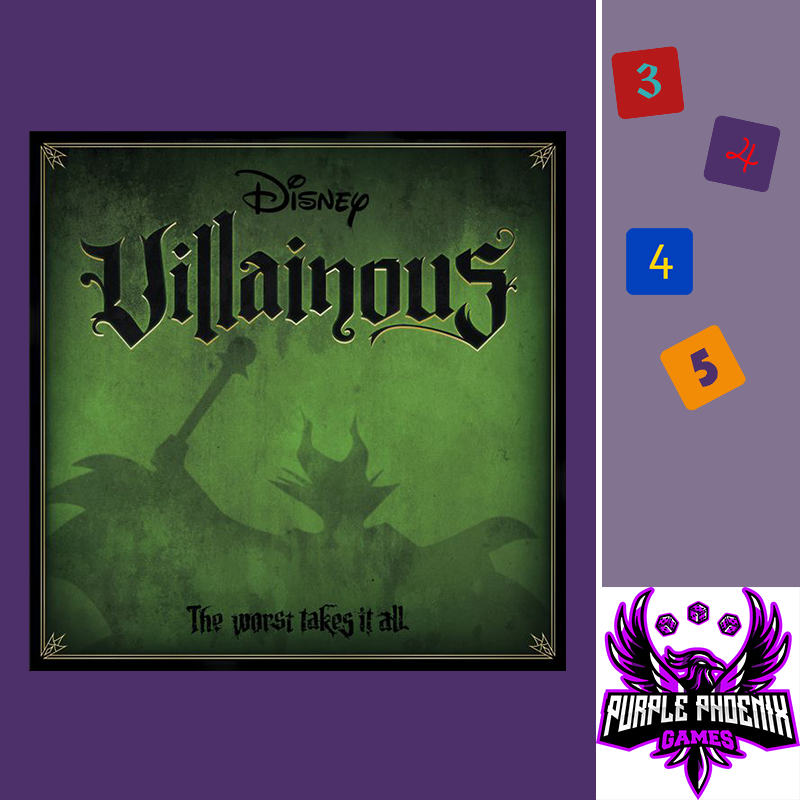
I am a sucker for a great theme. Or themes that turn the game around. Such is the case with Disney Villainous. Not often does a game allow you to play AS the bad guys against the good guys. That premise is interesting to me, and as I saw this release last year, I just knew I had to have it. Now that I have played it several times, with and without the first expansion, what do I have to say about it? Read on.
| Disney Villainous (2018) | Wonder Forge |
| 2-6 Players (with expansion) | 50 minutes |
| Ages 10+ | BGG Weight – 2.40 / 5 |
Disney Villainous (“Villainous” from here on) is a card game that pits players against each other in a race to complete individualized objectives to win the game. Players are in direct competition with each other and have devices to employ to spoil the plans of their competitors. Can Maleficent place out curses on all the lands in her realm before Hades can have three Titans storm on Mount Olympus? Can Prince John attain 20 power before either of them win the game? Such is Villainous.
DISCLAIMER: This game has a few standalone expansions now, with more on the way I’m sure. We are using components from the base game as well as the first expansion, “Wicked to the Core,” for this review. Should we decide to review the expansions as standalone games, we will link to the new material here. Furthermore, I do not intend to cover every single rule included in the rule book, but will describe the overall game flow and major rule set so that our readers may get a sense of how the game plays. For more in depth rules, you may purchase a copy from the publisher directly or from your FLGS. -T
To setup, each player will choose a big bad to play. Each character comes equipped with a colored pawn, a realm board with four locations, a deck of cards with matching pawn colored backs, a Fate deck with white back, and a playbook with tips on how to play that character. Also give every player a reference card that details the actions available. Shuffle each deck separately, give the starting player zero power from the cauldron, the second player one power, the third player two power, etc. Each player draws a hand of four colored back cards. Begin the game with the pawns on the leftmost location on the realm board and you are now ready to play.

Play works thusly: move your pawn to any unlocked location, complete any or all actions available at the location, draw your hand back up to four, next player. You MUST move on your turn, unless a card allows you to stay at your current location on your next turn. Once moved, the location will either show two or four options for actions. These could include play a card, activate a card, discard a card, gain power tokens, move an item or ally, move a Hero card, vanquish a Hero, or play cards from an opponent’s Fate deck. Some actions are self-explanatory (gain power tokens, et al), but some require further explanation.
Some cards will have an activation symbol displayed on them. This means that a pawn has to have been moved to a location with an activate card symbol, and the player must pay to activate the card for its special abilities. Easy. Moving an item, ally, or Hero typically means physically moving the cards from one location to another adjacent location. This is important for some villains’ objectives: cards need to enter play in one location but travel to another as part of the win condition. When a villain moves to a location with the Fate symbol, they will choose an opponent, look at the top two cards of their Fate deck, and choose one card to play and one card to discard. These are especially devious and can greatly hinder the player’s progress. In addition, when a Fate card resides on a realm board it covers the top symbols of a location, thus nullifying the player’s ability to use these symbols on future turns. Using the vanquish symbol requires a Hero to have been played on your board, and having enough strength in allies and items to meet or overcome the Hero’s strength. Heroes and any allies/items used in the fight are then all discarded to the appropriate discard piles.
Play continues in this manner until one player has achieved their victory condition.

Components. I have good and bad news. Good news first. The components are absolutely fabulous! Those pawns. SOOOO good. Each is a somewhat abstracted figure of the villain, but with some concrete callbacks and recognizable features. They are just so dang fun to handle and play with. I think the cards are good quality, but I forgot what they feel like outside of the sleeves I put mine in. The board components are great, the cauldron is flimsy, unnecessary, and unwieldy when putting back in the box, especially if you have one or more expansions. I have not found a decent way to put everything back in one box, so I am resigned to having both boxes with me every time I want to play. That’s the bad. I also have put all my sleeved cards into plastic deck boxes in the main game box along with the cauldron. Everything else gets put in the expansion box. I hope a better storage solution is on the horizon along with future expansions…
So as you can see from our rating graphic on top that we are spread out on this one. I love it, but I don’t see it ever breaching my Top 10 list. It does have a tendency to overstay its welcome with all the Fate cards making it more and more difficult to win the game. Once a player seems to be near winning every other player gangs up, or seems to when I have played. I get that it may come off as a negative, and the play length as well, but it’s all part of villains out-villaining each other. While Josh rated it as a three and may not ever willingly ask to play it, I have it at a five because I think it’s a great game with a wonderful theme, amazing components, and tons of expandability. With that, we at Purple Phoenix Games give Disney Villainous a boding 16 / 24. If you are a big Disney fan, can live with the Take That, and want something that looks incredible on the table, pick it up.

